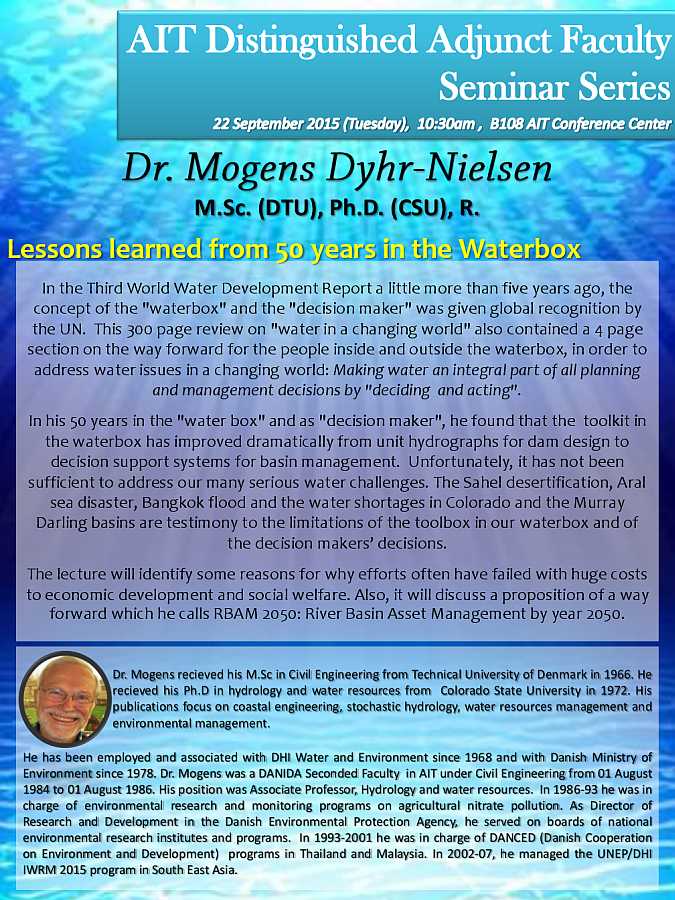
Abstract:In the Third World Water Development Report a little more than five years ago, the concept of the "waterbox" and the "decision maker" was given global recognition by the UN. This 300 page review on "water in a changing world" also contained a four-page section on the way forward for people inside and outside the waterbox, in order to address water issues in a changing world: Making water an integral part of all planning and management decisions by "deciding and acting".
In his 50 years in the "water box" and as "decision maker", Dr. Mogens Dyhr-Nielsen found that the toolkit in the waterbox has improved dramatically from unit hydrographs for dam design to decision support systems for basin management. Unfortunately, that it has not been sufficient to address our many serious water challenges. The Sahel desertification, Aral sea disaster, Bangkok flood and the water shortages in Colorado and the Murray Darling basins are testimony to the limitations of the toolbox in our waterbox and of the decision makers’ decisions.
The lecture will identify some reasons for why efforts often have failed with huge costs to economic development and social welfare. Also, it will discuss a proposition of a way forward which he calls RBAM 2050: River Basin Asset Management by year 2050.
About the speaker:
Dr. Mogens recieved his M.Sc in Civil Engineering from Technical University of Denmark in 1966. He received his Ph.D in hydrology and water resources from Colorado State University in 1972. His publications focus is on coastal engineering, stochastic hydrology, water resources management and environmental management.
Dr. Mogens has been employed and associated with DHI Water and Environment since 1968 and with Danish Ministry of Environment since 1978. Dr. Mogens was a DANIDA Seconded Faculty in AIT under Civil Engineering from 01 August 1984 to 01 August 1986. His position was Associate Professor, Hydrology and water resources. In 1986-93 he was in charge of environmental research and monitoring programs on agricultural nitrate pollution. As Director of Research and Development in the Danish Environmental Protection Agency, he served on boards of national environmental research institutes and programs. In 1993-2001 he was in charge of DANCED (Danish Cooperation on Environment and Development) programs in Thailand and Malaysia. In 2002-07, he managed the UNEP/DHI IWRM 2015 program in South East Asia.
About DAF:
The establishment of the Distinguished Adjunct Faculty (DAF) is a new initiative of AIT President Prof. Worsak Kanok-Nukulchai that recognizes the contributions made by former AIT faculty members and alumni who have pursued distinguished academic careers, drawing on their experience for the good of the Institute. The DAF is an honorary title bestowed on individuals who contribute voluntarily to enhance the work of the Institute. So far, 61 former faculty working at top universities around the world have accepted AIT’s offer to become a DAF. In addition, six alumni who possess a professorial rank in renowned universities have also accepted to be DAF.
Date: Tuesday, 22 September 2015
Time: 10:30 - 12:00 hrs
Venue: Room B108, AIT Conference Center
Register: To register, please click here: https://docs.google.com/a/ait.asia/forms/d/1Wwt19OewOmxGcyyVcWdGO3PpLQQFCQmaKwUMkH3fb8U/viewform
Kindly register/confirm your participation by Friday, 18 September 2015.
Details: More details are available at this link
